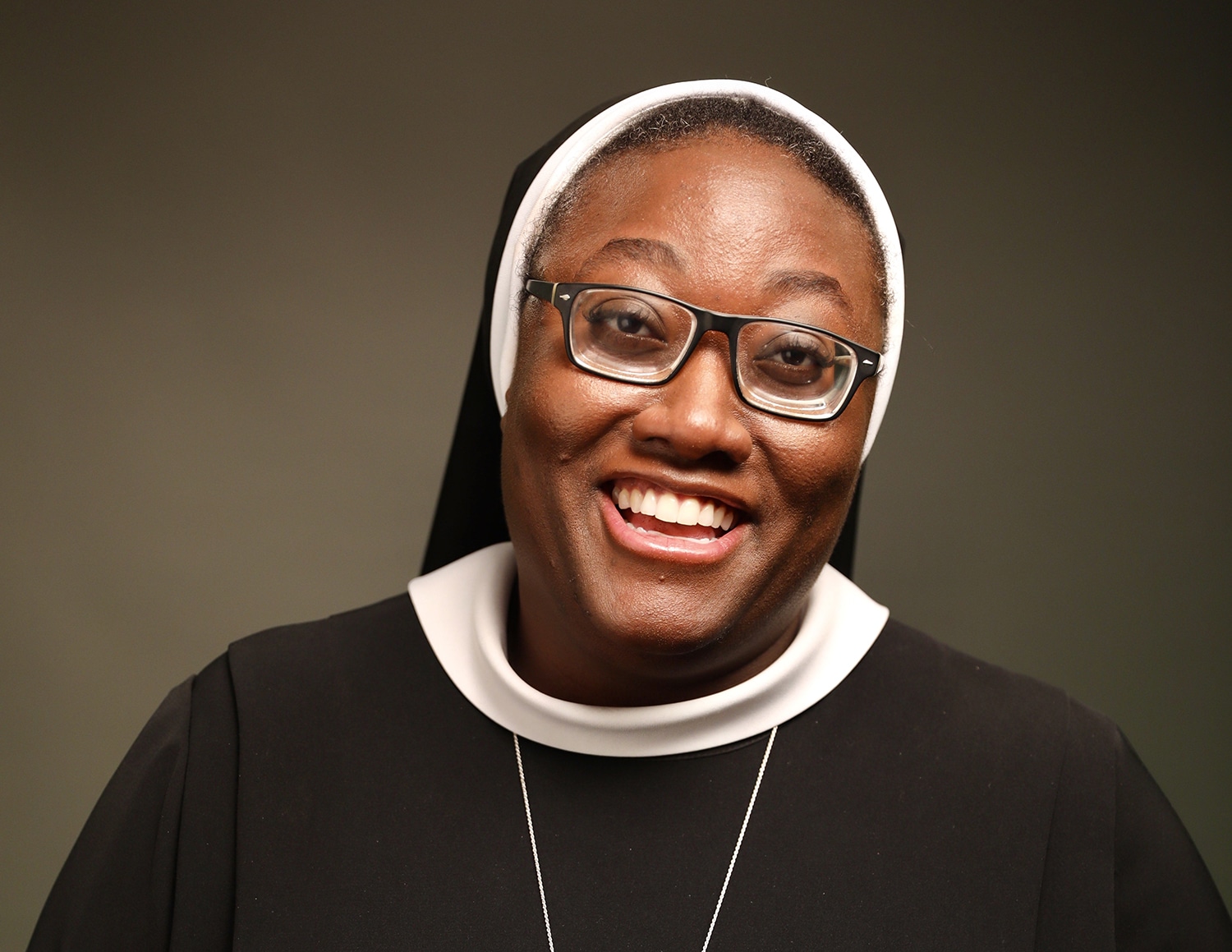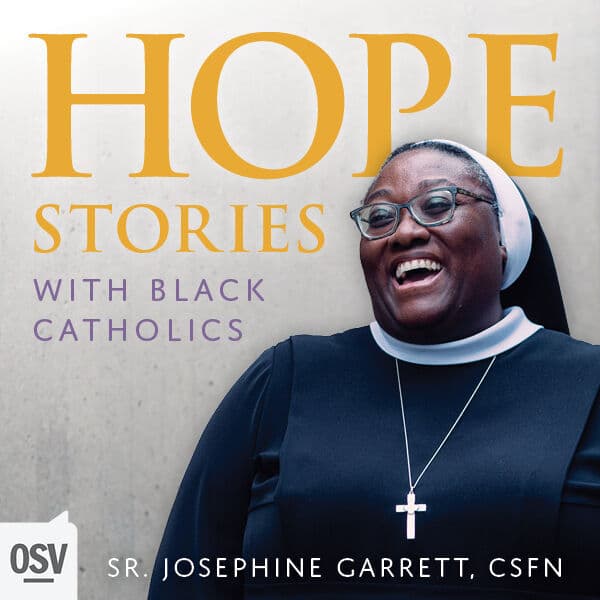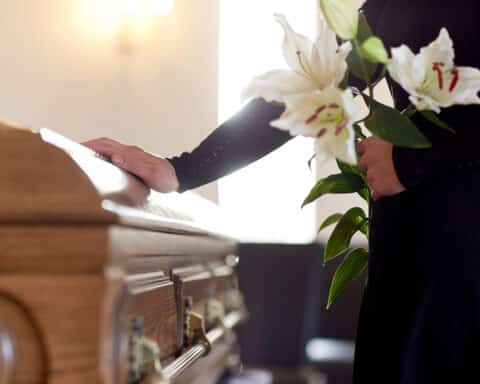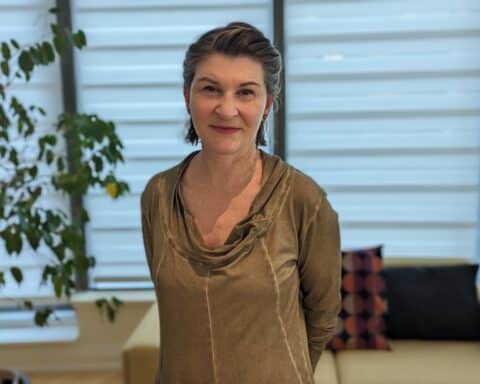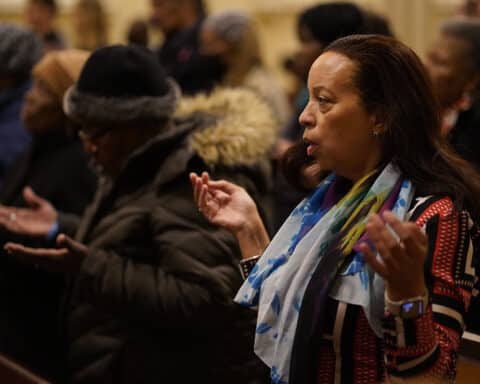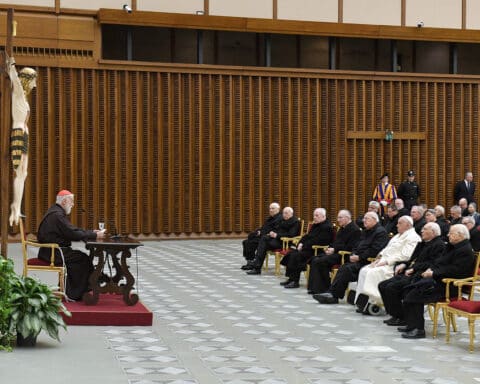Raised Baptist, Sister Josephine Garrett’s spiritual journey led her to embrace the Catholic faith in 2005. Deepening her commitment to the Church, she began her formation to become a religious Sister in November 2011. Her dedication and devotion culminated in November 2020 when she professed her final vows as a sister of the Holy Family of Nazareth.
Sister Josephine attended the University of Dallas, where she earned a BA in political philosophy with a business concentration. Prior to entering religious life, she worked as a Vice President in the Home Loans division of Bank of America, where she managed a staff of 200. Sister Josephine is a licensed counselor, offering her compassionate expertise as the school counselor for the cathedral grade school in Tyler, Texas. A highly sought after speaker, she has captivated audiences of up to 25,000 youths and young adults, sharing her inspiring message with passion.
Sister Josephine has recently launched a new podcast, titled “Hope Stories with Black Catholics.” In the first episode of the series, Sister Josephine sits down with friends and family to share stories of pain, struggle, consolation and joy that encourage even the most downhearted to participate in the hope of Jesus Christ more fully. Our Sunday Visitor caught up with Sister Josephine to discuss the new podcast.
This interview has been edited for length and clarity.
Our Sunday Visitor: Where did the idea for “Hope Stories” originate?
Sister Josephine Garrett: It was baby steps building into big steps. It’s been beautiful to watch how the Holy Spirit helped us, because we didn’t have an agenda or goal. I was invited to pray about serving as a host. And I mean, that invitation came to me to pray about being one of the hosts probably a year before we even came back to these conversations. And so I just kind of sat with the idea for about a year, and it was so open-ended. It was in the back of my mind. I would think about it sometimes, but I am not a big consumer of podcasts, so I didn’t want to be inauthentic. Again though, it was something I was just sitting with.
At the time, I was writing my book and my editor said, look, we’re not doing this because I think it’s going to distract her from finishing her work. And that’s when the idea came up: What if the podcast was connected to the book?
Our Sunday Visitor: What is “Hope Stories” about?
Sister Josephine: There is a section of the book where I talk about how much I love the University of Dallas and how the school became a place for me to encounter the Eucharistic Lord and begin to answer this call. And it was just an extension of the faith of my childhood — extending that and deepening it. And, as I was writing, an awareness came: What if I had not been willing to come into this Catholic space and be in a place where there were not a lot of people who look like me? Because had I not been willing to go there, I’m not sure anybody would have left to come looking for me.
So we started thinking about inviting guests who do a great job evangelizing Black Americans. There were so many conversations — I can’t even tell you how we just ended up making a space to gather a bunch of Black Catholics to shine light on their stories. There’s a mystery in how we arrived at it. It was built over time. And even once we finished it, it didn’t turn out to be what we originally thought we would have. What we show is the creation of a space so that people can abide as gift — and not gifts for the sake of making a specific point or gifts for the sake of fulfilling the next end of a particular agenda.
Our Sunday Visitor: When I saw the podcast, I thought, this is fabulous; this is a project so that Black Catholics can know they’re not alone. Then I was reflecting more on that. It that true? Is “Hope Stories” a podcast for Black Catholics, or did you have another vision of who would tune in, who the podcast was for?
Sister Josephine: We had many conversations about a desire that everyone would listen. I would love it if Black Catholics know they’re not alone. I would love it if people who administer and evangelize feel empowered to intentionally seek out Black Americans and recognize it when they look around and see certain cultures missing [and] to know: I’ve got to invite them to the Eucharistic table, because who knows who they might be in the Church. Who knows who they might be for the Church and what particular gifts they may bring, that the Church has been longing for? And so, I have a strong desire that everybody listens; I can see it appealing to many folks.
Our Sunday Visitor: How did you land on the name “Hope Stories”?
Sister Josephine: We had tons of conversations on the name of the podcast. … We went through probably three or four different name ideas. I remember when we were on that fourth name idea, I knew it wasn’t the one, but I also knew it was time to pray and time to stop talking. I didn’t say anything — we landed on one, and I knew it wasn’t it, but I thought: “I need to be silent now and I just need to pray and then it just came in prayer: “Hope Stories.”
This first series is going to be “Hope Stories with Black Catholics,” and if God wills it, we’ll tell other hope stories around whatever we may be called to highlight it in the future. The name was a huge discernment.
Our Sunday Visitor: When you embark on a project like this, a lot of times creatives have a vision for what it’s going to be like and then things happen along the way that are revelatory or transformative. Do you have any moments that were particularly beautiful or surprising that you’d like to share?
Sister Josephine: When I sat down, when I got to Rhode Island to do the interviews, I still did not understand — the only word I can use for it is the thesis of all of this. I still didn’t understand.
When I practice as a counselor, the foundational thesis in my counseling room, the foundational goal, is to help people grow in the call to be a gift. That may be to help my clients grow and see themselves as a gift or having the courage to make a gift of themselves in the in the places where they’re safe to do so, or having the courage to receive others as gifts. Everything that I do in that counseling room is about that. As a sister of the Holy Family of Nazareth, creating communities of love is in our mission statement.
After two days of hearing so many stories, that’s when it hit me: This is an extension of the work that I’ve already been called to: highlighting the giftedness of these people and at the same time healing. Highlighting the gift of this Black culture in the Church. And highlighting the absolute importance that is the Church. If we’re going to be who we say we are, if we’re going to be what we say we are — truly Catholic — then we have to understand the dimension of gift in one another. It was beautiful in the end, because it slowly dawned on me.
Our Sunday Visitor: Who is Sister Thea Bowman for you? And what role do you think she has in this project?
Sister Josephine: Her presence came into the project when we were trying to find a name. I Actually took her speech, which she made in 1989 to the USCCB, to the chapel. I don’t know why. … I don’t have a logical reason for why I turned to her in the chapel. I heard a quote really resounding. It’s a quote that we used in every single episode, asking the guests to reflect on it. Sister Thea says: “What does it mean to be Black and Catholic? It means that I come to my Church fully functioning. That doesn’t frighten you, does it? I come to my Church fully functioning. I bring myself; my Black self, all that I am, all that I have, all that I hope to become. I bring my whole history, my traditions, my experience, my culture, my African American song and dance and gesture and movement and teaching and preaching and healing and responsibility — as gifts to the Church.”
She names all these expressions of being Black, and she names all these various gifts that are part of Black culture that can be gifts to the Church. And so when I went to chapel, that’s where the thought came to ask every guest to reflect on that quote and how they see it as applicable today. It’s a challenge to us as Black Americans and a challenge to the Church to look and see where there are gifts that we need to call forward. So that’s her role in it.
Our Sunday Visitor: Because of our history and because of questions in our current climate, a lot of people would shirk a conversation like this or, at the very least, approach it with no small amount of fear. Did you have any hesitations about walking into the project?
Sister Josephine: Oh for sure. But I mean, I really couldn’t not do it. There’s just no way. I really mean it when I say everybody gets to depart from exactly where they are in their own journey to the Father. I’m not anybody to force anybody else along, because I know sometimes God is trying to pull me along. I know that when we talk about race, folks get real, real anxious. I’ll be honest with you: As a counselor, I can say, too, that they taught us in school that the topics that you bring up that make people super uncomfortable means that you’re in the right place. That discomfort is not an indicator that we’re talking about the wrong thing. It’s the indicator that we’re talking about the right thing. That’s what they taught us in counseling school.
These conversations are not about topics, they’re about lives. These conversations are not about issues and agendas. They’re about people and the giftedness of the human person. In this particular case, we are highlighting the giftedness of what it is to be Black, and that does not mean that others are without gift as well. We’re just highlighting this particular dimension of the Church.
I hope people listen. We have so much fun! Every episode is full of laughter. Every episode, every single guest … they just touch me so deeply. So I’m crying — like, I’m just boo-hooing — all throughout, so that’s what they’re going to hear. They’re going to hear me laughing because each guest was so generous with their stories and so willing to share real deep parts of their heart. I really felt overwhelmed at the honor to be on the receiving end of these stories. And so, gosh, I really hope people just see stories and lives and gifts.

